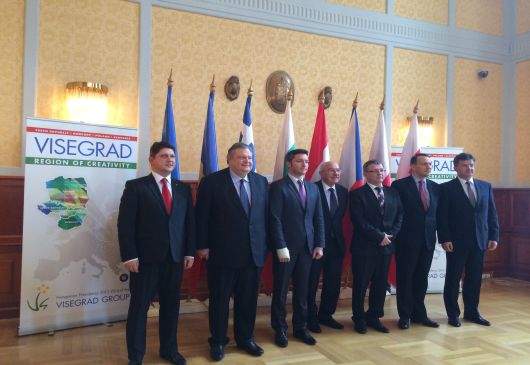 E. VENIZELOS: Many thanks to the Hungarian hosts for the excellent organisation and also for the warm hospitality. I am here in my double capacity: first of all in my national capacity as the Minister of Foreign Affairs of Greece, but also as the current President of the Council of the European Union, in order to preserve the institutional character and the continuity of this format.
E. VENIZELOS: Many thanks to the Hungarian hosts for the excellent organisation and also for the warm hospitality. I am here in my double capacity: first of all in my national capacity as the Minister of Foreign Affairs of Greece, but also as the current President of the Council of the European Union, in order to preserve the institutional character and the continuity of this format.
Let me make, very briefly, three remarks on the three main topics of our agenda.
On the field of energy policy and security, the new element – a very attractive and critical element – is the idea to construct the southern corridor, the Aegean-Baltic corridor, through the existing infrastructure, through the different interconnectors between our countries, and also in connection with the existing or the new terminals of LNG.
This is a very feasible, very simple, very practical, directly applicable idea, because we must preserve, in the central and eastern part of Europe, the security of supply and also overpass some obvious inequalities with the western part of our continent.
The first problem for us is security of supply, and the second one the affordability of price. The idea of this corridor is, maybe, a first answer to the two main issues on our energy policy.
The second point is on the management of migratory flows: This is a priority for the Greek presidency of the European Council, and this Press Conference was a great opportunity for me to express my gratitude and my warm thanks to my colleagues for the support of the priorities of the Hellenic Presidency of the Council.
It is our duty to protect the European borders, not only the maritime, but also the land borders, always in line with the protection of human rights, always in line with the European standards and principles. But on the other hand, this is a great question for our society, and we must give a very practical European answer, with the famous principle of burden- and responsibility-sharing between the member states of the European Union. This is a big problem for maritime and coastal countries like Greece, Italy, Cyprus, Malta – but also for countries on the land border line of the European Union, like Hungary.
The third point is on the great problem of Ukraine. On behalf of the Greek Presidency of the Council, I am in contact always with High Representative Catherine Ashton. As you know very well, the High Representative is the permanent President of the Council of Foreign Affairs, but the current Presidency of this semester, the Hellenic Presidency, has always the responsibility in the field of the Council of General Affairs, especially in the field of the enlargement policy. From this point of view, the Ukraine problem is our top priority. There is a vital need to protect the existence, the territorial integrity and also the social, regional cohesion of the country. It is our moral and political international duty to avert the return to violence. It is our duty to prevent civil war. It is our historical and moral duty to elaborate and present – together with the United States, Russia and the competent international organizations – a consolidated, integrated process in order to avoid the disorderly default and the destruction of the financial and economic level of Ukraine.
It is very important to persuade the civil society in Ukraine that our European proposal is something complete, something tangible, not only on the level of political institutions, democratic principles and on the level of protection of human rights, but also on the practical level of everyday life of ordinary people.
Thank you very much.
JOURNALIST: Question on the situation of the Ukrainian economy.
E. VENIZELOS: The first priority is the appointment of a new, inclusive government with the real capacity to protect stability and public order.
The second priority – this is my own proposal, under elaboration through the European institutions, and not an official answer – the second priority is to organize an international conference on the economic and financial problem of Ukraine, in order to avoid any type of disorderly default.
Because default, in the case of Ukraine, may be the real deconstruction of the country. It is absolutely important and vital to protect not only the national and regional cohesion, but also the statehood of Ukraine.
In this conference, the role of the European Union is cardinal, but so too is the role of the Russian Federation, of the United States, of the IMF and other competent international entities, and, of course, other countries ready to participate in this international effort; in the global effort, because the problem of Ukraine, the economic and financial dimension, is not only geopolitical, but also global.
The financial and economic approach, without doubt, is a global challenge, and it is our moral and political duty to give a serious and clever and flexible and applicable answer.
February 24, 2014


